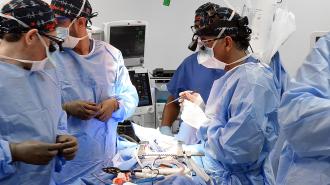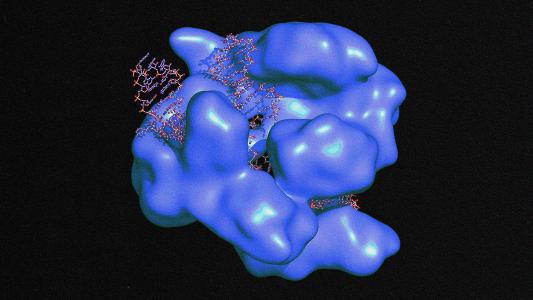Update, 11/01/23, 11:00 am ET: Lawrence Faucette passed away on October 30, nearly six weeks after he underwent surgery to receive the gene-edited pig heart. According to UMMC, his new heart performed well for the first month following his surgery, but began to show signs of rejection in the days prior to his passing.
“Mr. Faucette’s last wish was for us to make the most of what we have learned from our experience, so others may be guaranteed a chance for a new heart when a human organ is unavailable,” said lead surgeon Bartley P. Griffith. “He then told the team of doctors and nurses who gathered around him that he loved us. We will miss him tremendously.”
“Larry started this journey with an open mind and complete confidence in Dr. Griffith and his staff,” said Ann Faucette, Lawrence Faucette’s wife. “He knew his time with us was short, and this was his last chance to do for others. He never imagined he would survive as long as he did, or provide as much data to the xenotransplant program.”
“Larry’s family continues to be in awe of the man that he was and how he has shaped our lives,” she added. “He can never be forgotten.”
For the second time ever, a gene-edited pig heart has been transplanted into a person dying of heart disease — and so far, it’s working as his doctors had hoped.
It’s too soon to say whether this transplant will succeed — the first patient to receive a pig heart transplant died two months later, due to a combination of problems — but doctors are hopeful that this attempt has a better chance of success.
The challenge: Every year, thousands of people die in the US because they needed an organ transplant and one wasn’t available in time — the supply simply doesn’t match the demand.
Getting the body to accept an organ from an animal has historically proven to be impossible.
Organs from animals could close this gap, but preventing the immune system from attacking an organ from another person is already hard enough — transplant recipients must take meds that suppress their immune systems for the rest of their lives, which leaves them at higher risk of infection.
Getting the body to accept an organ from an animal, which would be even more “foreign” to the immune system and thus more worthy of attack, has historically proven to be impossible.
The idea: Genetic engineering could be the key to making animal-to-human transplants (aka “xenotransplantation”) a viable solution to the organ shortage.
By making 10 genetic edits to pigs, scientists at biotech company Revivicor believe they’ve found a way to prevent the human immune system from rejecting the pigs’ organs. Three of these edits knockout pig genes likely to trigger the immune system, six add helpful human genes, and one prevents a pig’s heart from growing too large for a human body to handle.
“We want our next patient to not only survive longer with a xenotransplant but to return to normal life and thrive for months or even years.”
Bartley Griffith
In January 2022, surgeons at the University of Maryland Medical Center (UMMC) transplanted one of Revivicor’s pig hearts into a person for the first time. That patient, 57-year-old David Bennett, had terminal heart disease and didn’t qualify for a human heart transplant.
Bennett died of heart failure two months later, and after extensively studying his case, the UMMC team determined that the cause was likely a combination of him being severely immunocompromised due to his poor health prior to the surgery and the activation of a latent pig virus in the heart.
“We were determined to shed light on what led to the heart transplant dysfunction in Mr. Bennett, who performed a heroic act by volunteering to be the first in the world,” said Bartley Griffith, who performed the surgery. “We want our next patient to not only survive longer with a xenotransplant but to return to normal life and thrive for months or even years.”
Second chances: That next patient turned out to be 58-year-old Lawrence Faucette — on September 20, UMMC surgeons replaced the Maryland man’s failing heart with one of Revivicor’s pig hearts.
Two days later, they reported that Faucette was breathing on his own and that the gene-edited pig heart was “functioning well without any assistance from supportive devices.”

In the hope of avoiding the issues experienced with Bennett, the gene-edited pig heart underwent an updated testing protocol to search for any viruses or pathogens that could pose a risk to humans, and Faucette will be receiving an experimental antibody therapy originally developed to treat ALS, along with the standard immunosuppressants, to prevent rejection.
“We are once again offering a dying patient a shot at a longer life, and we are incredibly grateful to Mr. Faucette for his bravery and willingness to help advance our knowledge of this field,” said Griffith. “We are hopeful that he will get home soon to enjoy more time with his wife and the rest of his loving family.”
Looking ahead: Like Bennett, Faucette was considered ineligible for a traditional heart transplant due to pre-existing conditions. The FDA granted emergency approval for his experimental pig heart transplant under its “compassionate use” pathway.
The researchers are hopeful that data from animal studies and these one-off transplants in volunteers like Faucette will provide enough evidence to convince the FDA to approve larger clinical trials of Revivicors’ pig hearts.
“This procedure is another significant step forward in bringing our vision of lifesaving xenotransplantation to those patients in desperate need,” said David Ayares, president and CSO of Revivicor.
We’d love to hear from you! If you have a comment about this article or if you have a tip for a future Freethink story, please email us at [email protected].





